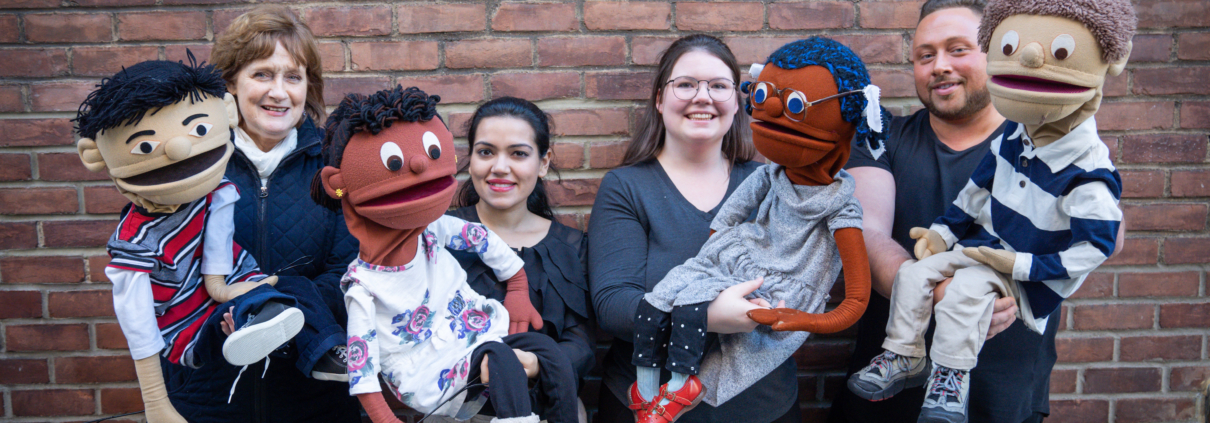Our Work Continues: Preventing Child Abuse for Families in Social Isolation
For over 150 years, The New York Foundling has worked in partnership with our neighbors to ensure that everyone can meet their full potential when facing challenging situations. This hasn’t changed, and our staff continue to provide life-changing and meaningful support in light of the COVID-19 pandemic. This series will share how The Foundling’s many programs are responding to the needs of their community.
Over the course of 34 years, The New York Founding’s Child Abuse Prevention Program (CAPP) has taught nearly 600,000 children in New York City how to recognize, resist, and report abuse. CAPP partners with hundreds of New York City elementary schools each year to present its Child Safety Workshop, which uses life-size puppets in skits to educate children about their right to safety. With the COVID-19 pandemic and the closure of city schools, CAPP has been unable to present their workshops. Students in our programs abruptly had to adjust to social distancing, online learning, and other disruptions to their daily routines. Knowing this, The Foundling’s programs sprang into action to help the young people we serve stay connected, feel safe, and know they are supported outside of the classroom walls.
The closure of schools across New York has caused considerable stress and anxiety in many communities. While families are concerned their children may disconnect socially or fall behind academically, there are several additional dangers presented by the switch to remote learning.
“We really rely on schools, as a community, to have eyes on kids,” Marion White, CAPP’s director, explained, “To see them on a daily basis and see that they’re present, that they don’t have any bruises.” Over the years, CAPP has helped schools serve this function – offering the opportunity for children to express concerns to a trusted adult and state-mandated reporter. At the same time, CAPP’s puppet-centered performance provides children with an age-appropriate way to understand abuse and maltreatment.
As schools continue to remain closed, educators and child welfare experts alike have expressed concern about the increased risk of sustained child abuse and maltreatment during this time. Families are increasingly socially isolated, some without access to food, stable income, even shelter. As stress rises, healthy parenting may encounter obstacles, and children won’t have easy access to support resources.
“One of the greatest fears with remote learning is that students in New York City will have fewer opportunities to speak up and ask a trusted adult for help,” Marion noted. “In the first three weeks since schools closed city-wide, the number of reports made to the New York State Central Register have decreased by nearly two-thirds,” indicating the decrease in contact between children and state-mandated reporters.
“You forget how much schools are a center point for the community. To not have that feels like a loss of control,” Trevor Raushi, CAPP’s program coordinator expressed. “CAPP is one of the only programs in the city that provides the opportunity for children to speak directly to an adult [about possible abuse]. We’re really trying to find a way to replicate that support model remotely.”
To do so, CAPP has developed a plan of action that includes providing educators with informational materials, offering virtual Positive Parenting Workshops, and reaching out directly to children through educational activities. The hope is that this approach will continue to inform children about their right to safety, while also addressing factors that may cause child abuse or maltreatment in the first place.
“We’re addressing the same mission as always: to protect children,” Marion said.
CAPP’s first step was to provide online safety tools for families and students as schools transitioned into remote learning. With school occurring remotely, children are accessing the internet more than ever, putting them at risk of coming into contact with online predators.
“The goal here is to lock some of the doors before they can get in,” Trevor explained.
With that in mind, the team created resources for parents and caregivers that detailed simple instructions to keep children safe online, whether on social media or gaming platforms. Additionally, CAPP provided suggestions for alternative educational platforms, along with resources to help families cope with anxiety and manage stress.
CAPP distributed the documents to partner schools at the end of March, and so far the response has been overwhelmingly positive.
“This is amazing,” one guidance counselor wrote, “Thank you all for putting this together in such an easily usable way. We are drowning in tasks and tech. You all just made my day!”
“Thank you so much,” another replied, “We posted it to our School Story on ClassDojo so it reached about 650 school members including parents, grandparents, caregivers, teachers, staff, and [administration].”
Moving forward, CAPP plans to create short video skits using the same puppets featured in the Child Safety Workshop to deliver educational messages online. Employing similar language and themes as Child Safety Workshop, CAPP hopes these video skits will remind students that even though they may not see their school teacher or counselor in person, they should still look to them for help when they feel unsafe.
CAPP is also collaborating with Safe Horizon Child Advocacy Centers, Prevent Child Abuse New York, The American Professional Society on the Abuse of Children, and the Department of Education to identify further ways to protect children in this critical time. With the situation evolving and changing quickly, the team is working hard to address urgent needs as they emerge.
You can access a full library of CAPP’s resources here. To learn more about how CAPP and The New York Foundling are responding to the COVID-19 pandemic in New York, visit our emergency response page. Stay tuned for more stories from the front lines as we continue to support our neighbors on paths to stability and strength.

